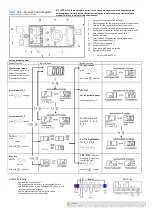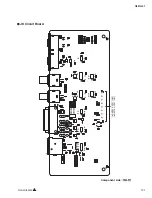
Adjusting the TV-VAVB3-E2 driver properties
TruVu™ VAVB3
-E2
CARRIER CORPORATION ©2022
Installation and Start-up Guide
All rights reserved
77
Device
The
Device
page provides the following information plus the items described in the table below:
•
BACnet device object properties for the TV-VAVB3-E2
•
The character sets supported by this device for BACnet communication
•
The controller clock's time and date
Configuration
BACnet System Status
The current state of the controller:
Operational
Download in Progress
Download Required
Backup in Progress
Non-Operational
The following fields refer to all networks over which the TV-VAVB3-E2 communicates.
APDU Timeout
How many milliseconds the device will wait before resending a message if no
response is received.
APDU Segment Timeout
How many milliseconds the device will wait before resending a message segment
if no response is received.
Number of APDU Retries
The number of times the device will resend a message.
Notification Classes
A BACnet alarm's Notification Class defines:
•
Alarm priority for Alarm, Fault, and Return to Normal states
•
Options for BACnet alarm acknowledgment
•
Where alarms should be sent (recipients)
Alarms in the i-Vu® application use Notification Class #1. The i-Vu® application is automatically a recipient of
these alarms.
Priorities
NOTE
BACnet defines the following Network message priorities for Alarms and
Events.
Priority range
Network message priority
00
–
63
Life Safety
64
–
127
Critical Equipment
128
–
191
Urgent
192
–
255
Normal
Priority of Off-Normal
BACnet priority for Alarms.
Priority of Fault
BACnet priority for Fault messages.
Priority of Normal
BACnet priority for Return-to-normal messages.
















































